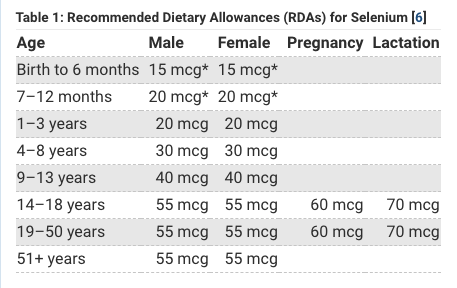Selenomethionine (SeMet): Uses, Benefits and Dosage

What is Selenomethionine?
Selenomethionine (SeMet) is a naturally occurring form of the trace mineral selenium that is found in many foods, such as nuts, seeds, seafood, and grains.
Trace minerals are essential minerals that are required by the body in small amounts (less than 100 milligrams per day). Although they are required in smaller amounts than major minerals such as calcium, magnesium, and potassium, trace minerals are no less important for overall health and well-being.
SeMet is used by the body to create proteins, but its primary role is as an antioxidant, helping to protect cells and tissues from damage caused by harmful free radicals. It is also involved in several other important functions in the body, including thyroid hormone metabolism, immune system function, and DNA synthesis and repair.
SeMet is considered an essential nutrient because the body cannot produce it on its own and must obtain it from diet or supplements.
Function Within the Body
As an Antioxidant
Selenomethionine’s role as an antioxidant is one of its most important functions in the body. Antioxidants are molecules that neutralize harmful free radicals that can damage cells and contribute to the development of chronic diseases.
Selenomethionine acts as an antioxidant by helping to produce antioxidant enzymes in the body. Selenomethionine also helps to recycle other antioxidants, such as vitamin C and vitamin E, which further enhances its antioxidant capacity.
The mineral has also been shown to reduce oxidative stress in cells and tissues, which can help to prevent damage to DNA and other cellular components.
Importance in Thyroid Hormone Metabolism
The thyroid gland produces and regulates the hormones that control metabolism, growth, and development in the body.
Selenomethionine is involved in the conversion of the less active thyroid hormone T4 into the more active hormone T3. Without adequate selenium, this conversion process can be impaired, leading to lower levels of active thyroid hormones in the body.
This can result in a range of symptoms, including fatigue, weight gain, cold intolerance, and reduced metabolism. In addition, inadequate selenium intake has been linked to an increased risk of thyroid disorders such as hypothyroidism and autoimmune thyroiditis.

How Much Selenium Do You Need?
As selenium is a trace mineral, only small amounts are needed for the maintenance of good health. Below is the RDA (Recommended Daily Allowance)

Source: National Institute of Health
Selenium deficiency is rare in North America due to adequate soil levels and the presence of fortified foods. Keep in mind that SeMet is a form of selenium. Research has shown that selenomethionine is one of the most bioavailable forms of selenium, which means that it is readily available for use in bodily functions.
What foods contain Selenomethionine?
- Brazil nuts: Brazil nuts are one of the richest dietary sources of selenium, and contain high levels of SeMet. Eating just a few Brazil nuts per day can provide adequate selenium intake for most people.
- Seafood: Fish and shellfish are good sources of SeMet, with tuna, halibut, and sardines being particularly high in selenium. Crab, shrimp, and oysters are also good sources of SeMet.
- Whole grains: Whole grains such as brown rice, quinoa, and oats contain moderate levels of SeMet, as well as other important nutrients such as fiber, vitamins, and minerals.
- Meat and poultry: Lean meats such as chicken, turkey, and beef are good sources as well. The same is true for organ meats such as liver and kidney.
- Dairy products: Milk, cheese, and yogurt contain small amounts of SeMet, along with other important nutrients such as calcium and vitamin D.
- Vegetables: While vegetables are generally not as high in SeMet as animal-based foods, some vegetables such as broccoli and mushrooms contain moderate amounts of selenium.

Do you need to Supplement SeMet?
In most cases, supplementing with SeMet is not necessary. Omnivores, in particular, likely get enough selenium from their diet, due to the amount of animal products they consume. Vegans and vegetarians are at a greater risk of being low in the essential mineral, in which case supplementation is ideal. If you are going to take a selenium supplement, selenomethionine is probably the best option for you, as it is highly absorbable.
Final thoughts
In conclusion, Selenomethionine (SeMet) plays a vital role in several key physiological functions in the body, including antioxidant defence, thyroid hormone metabolism, and immune system function. It is also a highly bioavailable form of selenium, which makes it an important nutrient for maintaining overall health and well-being.
While SeMet can be found in a variety of foods, many people may not be getting enough from their diets, particularly those who follow restricted diets or have certain health conditions. Incorporating SeMet-rich foods, such as Brazil nuts, seafood, and whole grains, or taking SeMet supplements under the guidance of a healthcare professional, may be helpful in maintaining optimal selenium levels.

